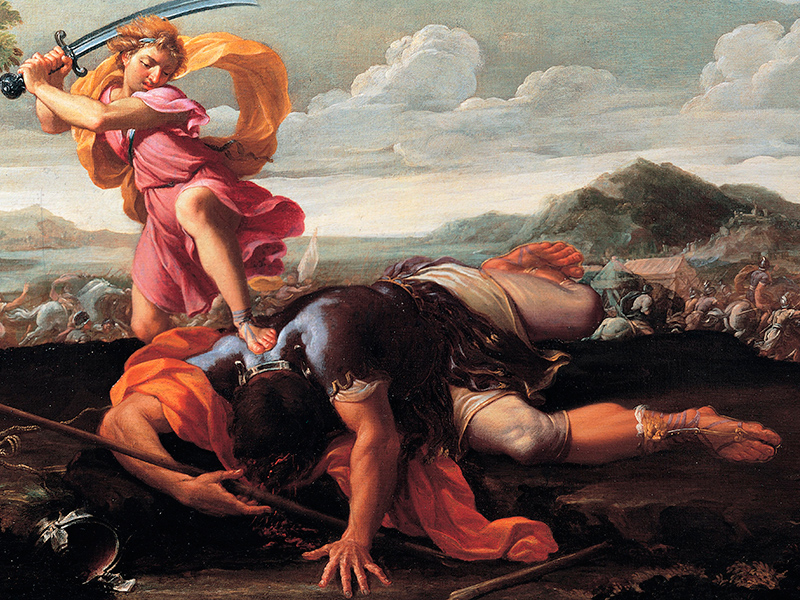King David, like Alexander the Great, was a superb conqueror. Like Cardinal Richelieu, he was calculating and devious. He was duplicitous like Claudius, adventurous like Jason and licentious like Don Giovanni. Like Odysseus, he faked insanity. Like Joan of Arc, he emerged from nowhere combining innocence with ardour. Like Napoleon’s marshal, Joachim Murat, he defected for a time. Like Che Guevara, he waged guerrilla war with a band of outlaws in the wilderness. Like Caravaggio, he was both a sublime artist and a skilled swordsman. And like King Lear, he was betrayed by his children.
Who would not wish to break bread with such a personality?
If we were to meet King David today, the first thing that would strike us would be that we could converse with him in Hebrew – no doubt a different Hebrew, the linguistic equivalent of Jacobean English to modern ears, but Hebrew nonetheless.
His biblical faith would be precisely the one we practise. His dietary customs would be in full conformity with those observed in religious households today. He would know Bethlehem – he was born there. During the many, many battles he fought throughout the land, he visited places such as Hebron, Ramah, Gibeon, Gath, En Dor and Mount Gilboa. He knew Jerusalem quite well, as he conquered it and brought the Ark to the city that was to bear his name. Just as we can walk the Old Testament lands on a journey through the Five Books of Moses, we can walk in Jerusalem, following King David’s footsteps, knowing where he danced, lived, loved and worshipped.
By contrast, if we were to invite David’s nemesis Goliath for high tea, for example, no one living in the entire Middle East today would understand his language, practise his faith or share his strange customs. Goliath spoke a now-extinct, non-Semitic, indo-European language with faint Greek roots. He was a polytheist worshipping gods called Dagon, Baal and a whole group of half-animal, half-human deities. His religion was an offshoot of the Canaanites and many in his community believed in human sacrifice, lewd rites, unrestrained orgies and sacred prostitution. His diet included pork, and he drank copious amounts of wine and other alcoholic spirits. His civilization left no major landmarks, citadels, laws or codes. Philistine was one of many ancient but insubstantial civilizations that shone briefly on the stage of history and departed without leaving a trace behind.
READ: AN IMAGINATIVE, MOVING PORTRAIT OF KING DAVID
But David, although he did not observe all the commandments, would know the Books of Moses by heart. He would lament that, just as Moses was not allowed to enter the Promised Land, he was not permitted to build the Temple because of the blood on his hands. But he would find solace in the fact that he bought the consecrated Mount Moriah for 600 shekels, thus enabling his son, Solomon, to complete the task, as it was foretold by the prophets.
He would explain that right from the beginning of Jewish history, the patriarchs recognized the spiritual power of the mount. He would remind us that this is the stead where Abraham climbed to offer Isaac to the Lord and where Jacob dreamt of a ladder going to heaven. This is the place, he would say, where God’s presence is felt more powerfully than at any other place on earth.
After all these centuries, we, the remnants of the Jewish People, are still moved profoundly by his lamentations, beseech the Lord at the gates of heaven with his prayers, imagine his shadow on the high walls of Jerusalem, hear the echoes of ancient Israel in his lyre and delight in his poetry.
It’s ironic then, that the United Nations Educational, Scientific and Cultural Organization (UNESCO), an organization allegedly committed to “building peace in the minds of men and women,” recently passed a resolution designed to erase the incontrovertibly documented spiritual history of Jews in King David’s city. As Alexander Solzhenitsyn observed, “To destroy a people, you must first sever their roots.” That UNESCO should lend itself to such ignominy by attempting to deracinate Jews from the holiest repository of the foundations of their faith and dreams dating from times immemorial is distressing.
Napoleon was spot on when he wrote, “History is a set of lies agreed upon.”
